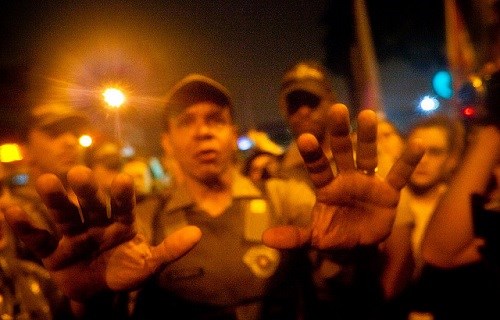Reporters Without Borders draws attention to violence against Brazilian journalists
A campaign by non-profit press freedom advocates Reporters Without Borders (RWB) called “Some wins don’t deserve medals” (Algumas vitórias não merecem medalhas) aims to raise awareness about the insecure working conditions of Brazilian journalists. The name of the campaign derives from the fact that at least 22 journalists were killed in connection with their work since the last Olympics in 2012. At the moment, Brazil is considered the second most dangerous country in Latin America for media personnel. The country is also ranked 104th out of 180 countries in the RSF’s 2016 World Press Freedom Index.
Securing the physical safety of journalists is important to enable journalistst to perform their work. According to RWB, the big demonstrations in 2013 in connection with the Confederations Cup were accompanied by violent incidents towards media personnel. Reporters covering the protests were physically attacked and targeted by police officers. A tense political climate in Brazil contributed to the creation of mistrust towards journalists. During streets protests, journalists were targeted by demonstrators who associated them with the editorial position of their media outlet. Brazilian authorities were not tackling this long-standing problem, RWB writes.
This trend of negligence of journalists’ safety continued during the protests and the social unrest that accompanied the FIFA World Cup held in Brazil in 2014. According to the Brazilian Association of Investigative Journalism (ABRAJI), 190 cases of aggression against journalists were reported during the protests, the majority of them were committed by the police as stated by the ABRAJI.
In March 2014, the Secretariat for Human Rights (SDH) released a report on violence against journalists in Brazil, one month after TV Bandeirantes cameraman Santiago Ilídio Andrade’s death during a protest in Rio de Janeiro on 6 February 2014. This report revealed that no less than 321 journalists had been the victims of violence from 2009 to 2014.
RSF is aiming to bring on the debate and draw attention to four key proposals which can help improve journalists’ safety and working environment in Brazil.
- Create a Public Observatory on Violence against Journalists in close collaboration with the UN in order to register attacks on journalists, provide support measures for victims and assist in investigations.
- Extend the Protection Programme for Human Rights Defenders (PPDDH) tojournalists and bloggers who have been the target of threats or murder attempts.
- Call upon the federal authorities to investigate into crimes of violence against journalists.
- Guarantee the safety of journalists during demonstrations by establishing good conduct procedures for the police, based on the non-violence procedures adopted by the Council for the Defence of Human Rights in Resolution No. 6 of 18 June 2013.






